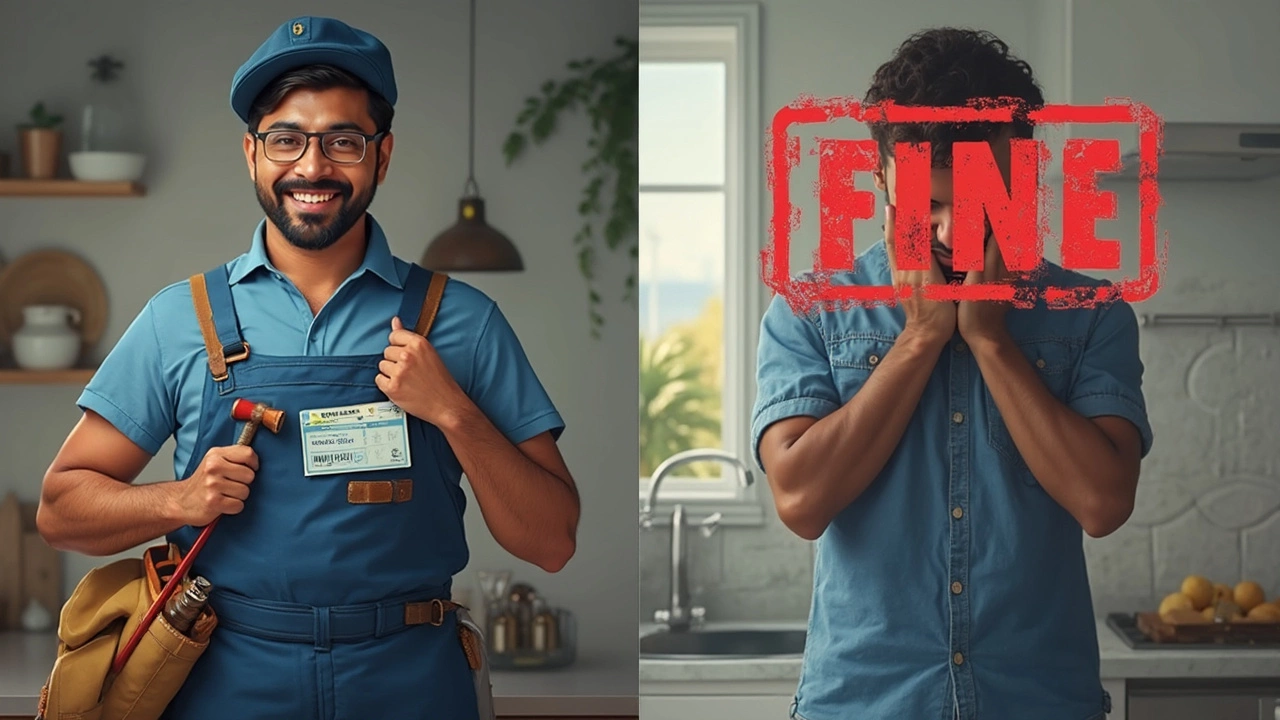If you’re in California and thinking about fixing a leak or swapping out a faucet for pay, here’s the deal: state law says most plumbing jobs are off-limits unless you’re licensed. Sounds harsh, but there’s a reason behind it—bad plumbing can flood homes, cause mold, or even affect the whole neighborhood’s water quality.
So what if you’re just a handy person hoping to earn some cash on weekends? Well, the state lets you do minor stuff—like changing shower heads or tightening a leaky handle—without a license. But once money gets involved, and you’re touching anything to do with water supply, drain lines, or major repairs, the rules change fast. Go beyond your limits, and you could face fines that wipe out any profit and even get flagged with a criminal charge.
Here’s another thing most folks don’t realize—California makes it clear that any plumbing job worth more than $500 for materials and labor (yes, $500 total!) legally needs a licensed contractor on site. That means replacing a toilet or running new pipes is definitely off the table unless you’re working under a pro or have a license yourself. Plumbing inspectors and unhappy customers can and do report unlicensed work, so it’s not just scare tactics.
- Who Actually Needs a Plumbing License?
- The Risks of Skipping the License
- What Can Handymen Legally Do?
- How to Get Qualified Safely
Who Actually Needs a Plumbing License?
If you’re planning to work on anything more than a simple repair in someone’s house, you probably need a plumbing license California law requires. It’s not just about having fancy paperwork—California’s Contractors State License Board (CSLB) spells out exactly who’s supposed to get licensed and why.
Here’s the breakdown. Anyone who takes on jobs that total $500 or more (labor and materials combined) for plumbing—like running new pipes, fixing sewer lines, or installing water heaters—needs a C-36 plumbing contractor license. Even if you’re a whiz at repairs, you can’t just call yourself a plumber, advertise, or bid for work over that amount without state approval.
- If you want to run your own plumbing business—even solo—you need a license.
- If you work for a company and just help out (never alone or in charge), you might get by as an apprentice or helper. But any work you advertise or contract yourself? Not legal without that license.
- Handymen can legally do plumbing jobs under $500 if it’s minor, but the second you hit that amount or touch a main line, you’re crossing into licensed territory.
Why is California so strict? Stats show the state has cracked down over the past five years—over 1,300 cases of unlicensed contracting were investigated by the CSLB in 2023 alone. Licensed pros have to show experience, pass a test, and get background checked, so they don’t mess around when it comes to safety.
| Type of Work | License Required? |
|---|---|
| Replace faucet/fixture (under $500 job) | No |
| Install water heater (over $500 job) | Yes |
| Fix sewer main | Yes |
| Help as an apprentice | No (under supervision) |
| Bid for plumbing contract | Yes |
If you’re caught working without the right license, you could face fines, lose your pay, or get hit with a misdemeanor on your record. It’s not worth risking your future for quick cash.
The Risks of Skipping the License
Trying to work as a plumber in California without the proper license isn’t just risky—it’s asking for real trouble. First off, the Contractors State License Board (CSLB) can issue a fine of up to $15,000 if you get caught doing plumbing without a legal license. Even first-time offenders can face a $5,000 civil penalty, plus a mandatory 90-day jail sentence in some cases. That’s way more than any paycheck you’d get from a side job.
It’s not just about money, either. If a job goes south—think water damage, burst pipes, or sewage backups—the homeowner’s insurance probably won’t cover unlicensed work. That leaves both you and the client footing the bill. And if someone gets hurt, like slips on a wet floor caused by your fix, you could end up in a lawsuit fast.
According to the CSLB: "Unlicensed contracting is usually a misdemeanor, and the penalties are costly. Most folks underestimate the seriousness until they see the consequences."
Even small jobs can snowball if things go wrong. Clients who find out you’re unlicensed might refuse to pay and are legally within their rights, no matter how much work you put in. Plus, if you ever want to become a pro plumber in the future, a record of illegal work can make getting that plumbing license California a nightmare.
- Big fines and possible jail time
- No insurance coverage for unlicensed work
- Clients can skip out on paying you
- Tougher time getting a license down the line
- Possible lawsuits if there’s property damage or injuries
All in all, skipping the license isn’t just bending the rules. It can seriously backfire for anyone trying to make it in plumbing, no matter how skilled they are with a wrench.

What Can Handymen Legally Do?
If you’re calling yourself a handyman in California and hoping to tackle plumbing, you should know your limits. The state draws a pretty clear line: handymen can only do minor plumbing work and the total cost—labor plus parts—cannot exceed $500 per job. Doesn’t matter if it’s for an hour or a whole weekend. Go over that and you’re in hot water, legally.
So, what’s safe and what’s asking for trouble? Handymen are generally allowed to:
- Replace or repair faucets and shower heads
- Unclog drains (using simple tools, not replacing pipes)
- Swap out toilet seats or internal tank hardware
- Install or fix garbage disposals (as long as you’re not touching the main drain or water supply)
- Fix leaky traps under sinks (but not the pipes inside the walls or floor)
The law says once you start dealing with anything inside the walls, attaching to the main water supply, installing new water heaters, or working on gas lines, you’re out of handyman territory. That’s when you need a plumbing license California and proper permits. If it sounds risky, that’s because the state wants to keep big or risky jobs in the hands of trained pros.
Here’s something a lot of people get wrong: even if a client says, “Hey, don’t worry about the permit,” you’re still the one who could get fined or even sued if something goes wrong. The job size limit is real. Check out these common tasks and if you need a license:
| Task | Legal for Handyman? | Notes |
|---|---|---|
| Unclogging a kitchen sink drain | Yes | Only basic snaking, no pipe removal |
| Replacing a shower head | Yes | Don’t alter the pipe |
| Running new water lines | No | License required |
| Replacing a toilet | Depends | If job is under $500 total; more complex jobs need a license |
| Water heater installation | No | Always needs licensed plumber and permits |
Bottom line? Use common sense and stay within those limits. Jobs under $500, no messing with walls or main lines, and nothing dangerous. When in doubt, check with the California Contractors State License Board (CSLB)—they have clear guides, and if you mess up, they’re often the folks who come knocking.
How to Get Qualified Safely
If you want to work as a plumber in California and avoid fines or getting blacklisted, you’ll need to play by the rules. That means earning your plumbing license California—no shortcuts.
Start by picking the right training program. Community colleges, some trade schools, and union apprenticeships all offer solid hands-on training. Programs usually last two to four years, but you’ll get paid as an apprentice while you learn. These programs go way beyond fixing leaks: you’ll handle gas lines, read blueprints, and get used to California’s strict building codes.
Once you’ve racked up at least four years (about 8,000 hours) working under a licensed plumber, you can apply for the California C-36 Plumbing Contractor license. California wants real experience, and you’ll need to prove your work history with signed statements from employers or journeymen who supervised you.
The next step is to pass the state test. The exam isn’t just basic pipe stuff—it tests your knowledge of safety, law, and business. Many people sign up for prep courses, even if they have years of experience, just to make sure they’re ready. Everybody who applies for a C-36 license also has to pass the CSLB’s law and business exam. No way around it.
After you ace the test, you’ll need to pass fingerprinting and a background check. Then you can finally get your license card and start taking bigger plumbing jobs legally. Remember, if you plan to work on your own (not just as an employee), you’ll also need a contractor’s license bond and insurance. Skipping insurance is a rookie mistake that can ruin your business if something goes wrong on the job.
Bottom line: get trained, get experience, and take the test seriously. It’s a much safer (and way less stressful) path than risking big fines working without a license in California.





Write a comment